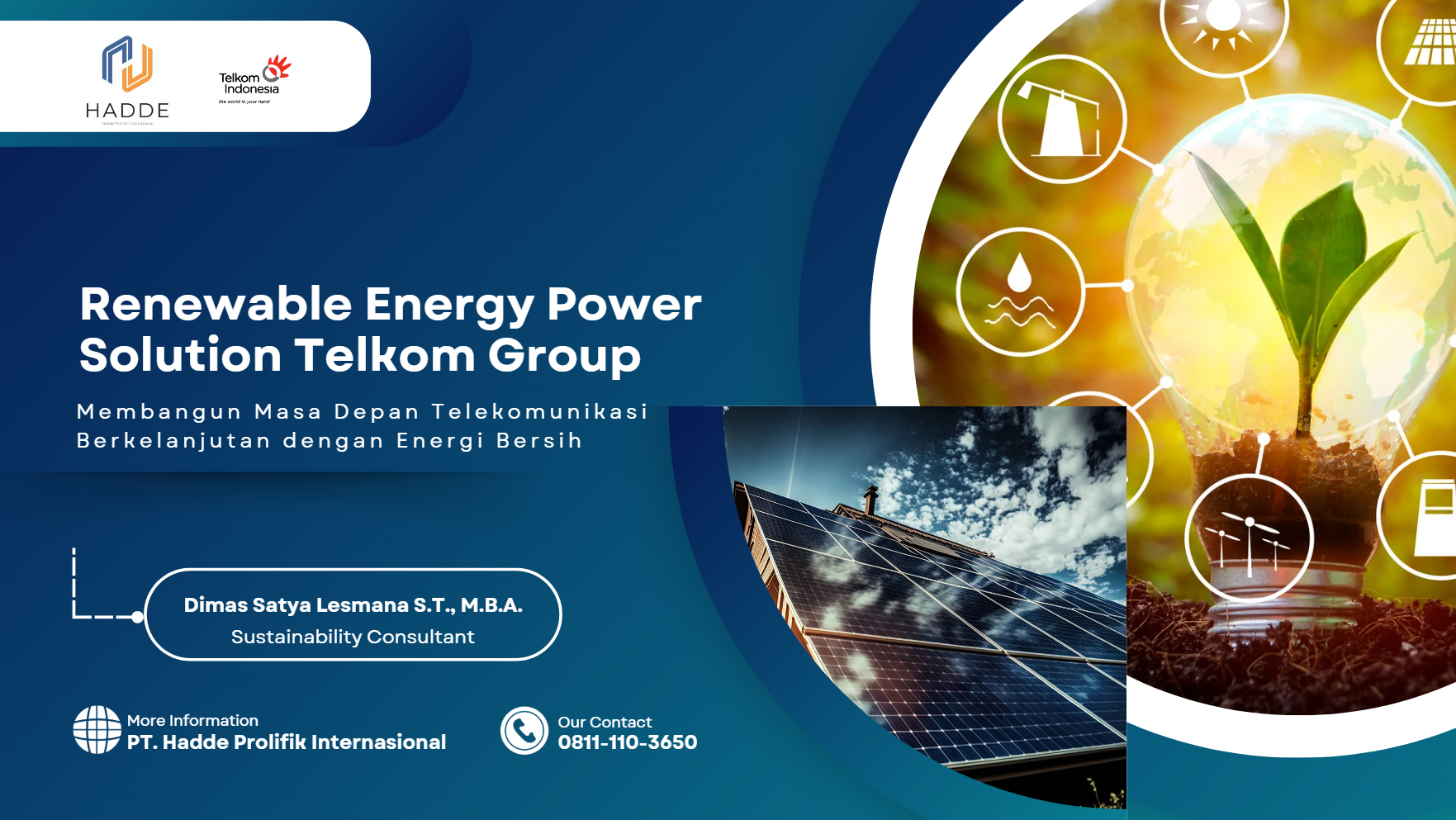Introduction
In the age of digital transformation, telecommunications infrastructure is the backbone of Indonesia’s connectivity. As the nation’s leading telecommunications provider, Telkom Group is committed to sustainability and operational efficiency. Recognizing the challenges posed by climate change and the rising costs of non-renewable energy, Telkom has partnered with PT Hadde Prolifik Internasional to transition towards renewable energy solutions.
The collaboration aims to power Telkom’s Base Transceiver Stations (BTS) with a combination of wind and solar energy, significantly reducing carbon emissions and promoting environmental sustainability. This initiative aligns with Indonesia’s national commitment to achieving net-zero emissions by 2060.
The Need for Renewable Energy in Telecommunications
Telecom towers are essential for maintaining network connectivity but are energy-intensive, especially in remote areas where diesel generators are often the primary power source. Key challenges include:
- High Operational Costs: Diesel generators have high fuel costs and require frequent maintenance.
- Environmental Impact: Heavy reliance on fossil fuels contributes to carbon emissions and environmental degradation.
- Energy Supply Reliability: Remote locations face challenges with grid connectivity, making renewable energy a viable alternative.
The Solution: Green BTS Powered by Hybrid Renewable Energy Systems
PT Hadde Prolifik Internasional, in collaboration with Telkom, has developed a Green BTS initiative. This project focuses on utilizing hybrid solar photovoltaic (PV) panels and wind turbines to power BTS towers sustainably. The solution includes:
- Solar Panels: Harnessing sunlight during the day to generate clean energy.
- Vertical Wind Turbines: Utilizing wind energy, particularly during the night or cloudy conditions, ensuring a continuous power supply.
- Energy Storage Systems: Battery systems to store excess energy, providing backup power and ensuring operational stability.
How the Hybrid System Works

- Weather Analysis: Installation of weather stations at BTS sites to collect data on wind speeds, solar radiation, and temperature.
- Data-Driven Optimization: Analysis of real-time data to determine the most efficient combination of solar and wind energy for each location.
- Seamless Integration: The system includes smart controllers and inverters that efficiently manage the energy flow, ensuring a stable power supply even in challenging weather conditions.
Pilot Project in Kupang, East Nusa Tenggara

The first pilot project for the Green BTS initiative is being conducted in Kupang, a region with high wind speeds and ample sunlight, making it ideal for hybrid renewable energy solutions. The project aims to:
- Reduce Carbon Emissions: Transitioning from diesel generators to wind and solar energy, significantly cutting down greenhouse gas emissions.
- Lower Operational Costs: Saving on fuel expenses and reducing the frequency of maintenance required for diesel generators.
- Increase Energy Independence: Providing a reliable and sustainable power source in off-grid locations.
Why Kupang?
Kupang was selected based on its favorable weather conditions, including consistent wind speeds and high solar radiation. This makes it an ideal testing ground for the hybrid energy system, which, if successful, can be scaled to other regions across Indonesia.
Benefits of the Green BTS Initiative

1. Cost Savings and Operational Efficiency
- Reduced Fuel Costs: By switching to renewable energy, Telkom can save on diesel fuel expenses, which constitute a significant portion of operational costs.
- Lower Maintenance: Renewable energy systems require less frequent maintenance compared to diesel generators, reducing downtime and service interruptions.
2. Environmental Sustainability
- Carbon Emission Reduction: The hybrid system is expected to reduce carbon emissions significantly, supporting Telkom’s sustainability goals.
- Aligning with National Targets: Contributing to Indonesia’s net-zero emission goals by 2060.
3. Enhanced Energy Security
- Reliable Power Supply: The hybrid system provides a stable energy source, ensuring that BTS towers remain operational even during grid outages.
- Scalability: The solution is scalable and can be adapted to different regions, making it ideal for nationwide implementation.
Case Study: Cost-Benefit Analysis
The pilot project in Kupang revealed significant cost savings and environmental benefits:
- Initial Investment: While the upfront cost of installing solar panels and wind turbines is higher, the long-term savings in fuel and maintenance costs result in a 9% to 14% reduction in total expenses over ten years.
- Operational Efficiency: The hybrid system reduced downtime and ensured continuous network connectivity, especially in remote areas with unreliable grid access.
- Carbon Footprint: The project has the potential to cut down carbon emissions by up to 50%, aligning with global sustainability standards.
Future Expansion Plans
Following the success of the pilot project, Telkom and PT Hadde Pro plan to expand the Green BTS initiative to other regions across Indonesia, focusing on areas with high renewable energy potential. The roadmap includes:
- Nationwide Rollout by 2025: Scaling the hybrid system to Telkom’s entire network of BTS towers.
- Collaboration with Government and Stakeholders: Engaging with policymakers to secure incentives and support for renewable energy adoption.
- Continuous Innovation: Leveraging data analytics to optimize energy use and explore additional sustainable technologies.
Conclusion
The partnership between Telkom and PT Hadde Prolifik Internasional marks a significant milestone in Indonesia’s journey toward sustainable telecommunications. By transitioning to renewable energy, Telkom not only reduces its environmental impact but also sets a precedent for other industries to follow.
Are you interested in exploring sustainable energy solutions for your business? Contact PT Hadde Prolifik Internasional to learn how we can help you achieve your sustainability goals.
Contact Us
Address: Jl. Trunojoyo No.11, Bandung, West Java 40115
Phone: +62 812-2122-6727
Email: info@haddepro.co.id
